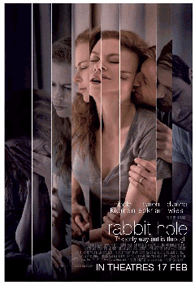
The twist in Rabbit Hole is similar to Kore-eda Hirokazu’s Still Walking. Kidman creates a fascinating character who buries herself in the mundane rituals of home-making and family with what might come across as a deliberately passive-aggression. Is she really doing this on purpose? At what point, if at all, will her character truly find redemption and release? Lindsay-Abaire’s script makes the un-Hallmark suggestion that grieving, wronged people can have a streak of malice and cruelty while Kidman’s deliciously nuanced and ambiguous acting, supported by the ensemble cast, brings to life this unsettling and uncommon idea.
But what should a film do with such ambiguous characters? It would be a waste to send them through a generic script. Lindsay-Abaire’s screenplay is as craftily ambiguous as Kidman’s character – taking a very economical approach to exposition, the script never tells you everything you want to know at one go. You hardly know what’s going to happen next but what does transpire feels more true to real life than most films based on ‘real characters and events’.
It’s very rare to have a film so thoroughly subvert a genre that is rife with clichés and at the same time feel so naturalistic and realistic rather than theatrical or literary.

